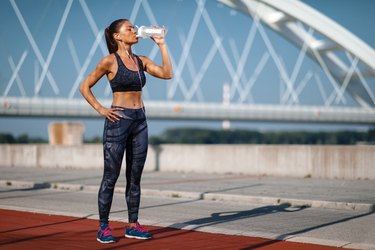
If you love Gatorade thirst quenchers but don't want to drink so much sugar every time you rehydrate, the Gatorade G2 drink might be for you. This lower-sugar version provides a similar electrolyte balance as the original, but replaces some sugar with artificial sweeteners.
Gatorade G2 Nutrition Facts
Video of the Day
As the Gatorade website explains, the Gatorade G2 drink uses a similar electrolyte formula to that in the original Gatorade Thirst Quencher formula but has half the sugar, less than half the carbs and less than half the overall calories. Available flavors include grape, lemon-lime and cool blue.
Video of the Day
The Gatorade G2 nutrition facts include an electrolyte solution of 160 milligrams of sodium and 45 milligrams of potassium; 8 grams of carbohydrates, 7 grams of which come from sugar; and just 30 calories per 12-ounce bottle.
The G2 drink ingredients start with water; followed by sugar, sucralose and acesulfame potassium (aka acesulfame K) as sweeteners; salt; natural and artificial flavors; the electrolyte solution; and coloring agents. Some flavors contain modified food starch.
If you like the idea of a low-sugar version of Gatorade, you might appreciate Gatorade Zero, an even lower-calorie version of Gatorade G2. It comes in flavors that include orange, lemon-lime, berry, glacier freeze and glacier cherry, and has just 5 to 10 calories and 1 to 2 grams of carbohydrate per 12-ounce bottle.
Gatorade Zero has 270 grams of sodium and 75 grams of potassium for electrolytes; other ingredients include citric acid, salt, gum arabic, natural flavor, glycerol ester of rosin, coloring agents, and sucralose and acesulfame K as sweeteners. Some flavors also have gum arabic, modified food starch, mixed triglycerides and sucrose acetate isobutyrate.
Finally, Gatorade's original Thirst Quencher drink comes in flavors that include fruit punch, lemon-lime and orange. It contains 270 milligrams of sodium and 75 milligrams of potassium to help replenish electrolytes; along with 36 grams of carbohydrates (34 of which come from sugar) and 140 calories per 20-ounce bottle.
In addition to water, electrolytes and citric acid, the original thirst quencher also has sugar and dextrose as sweeteners, modified food starch, natural flavor, glycerol ester of rosin and coloring agents. Some flavors also contain gum arabic.
Read more: The Benefits of Electrolytes in Water
Sugar vs. Artificial Sweeteners
So, which version of Gatorade should you drink? That depends entirely on your health and personal situation. Consistently consuming a lot of added sugar, whether in food or sports drinks, isn't good for anybody; as Harvard Health Publishing explains, consuming too much added sugar can increase your risk of heart disease, elevate your blood pressure and increase chronic inflammation.
They also cite sugary beverages as particular culprits in turning off the body's appetite-control system and helping you consume enough calories to gain weight without even realizing it.
But even though artificial sweeteners help bring down both calories and added sugar content, not everybody agrees that they're great. As the Center for Science in the Public Interest explains, animal studies have produced ongoing concerns about increased risk of cancer from both acesulfame K and sucralose, even though both have FDA approval. Both artificial sweeteners are present in Gatorade G2 and Gatorade Zero.
Still, you do need to maintain the appropriate electrolyte balance in your body, which sometimes means replacing electrolyte minerals — especially if you've been exerting yourself strenuously for a long period, or are taking medications that throw off your electrolytes. As Rush University Medical Center explains, electrolytes help regulate everything from hydration to your nervous system and muscle function, including your heart.
One solution? Use electrolyte powder mixes that contain stevia, a natural calorie-free sweetener, instead of sugar or artificial sweeteners. You can also eat foods that contain electrolytes. If you're a diehard fan of Gatorade or other sports drinks that use added sugar and artificial sweeteners, limiting yourself to moderate consumption will make it easier for your body to handle the added punch of all that sweetness.
Read more: Healthy Electrolyte Drinks